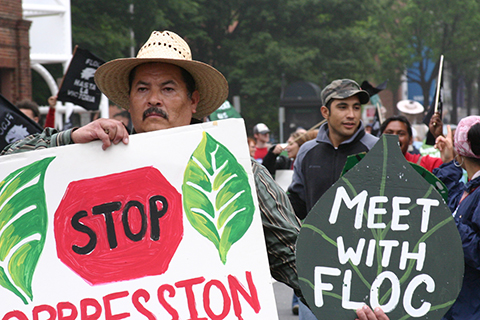"The men found me a pair of rubber boots and a roll of plastic bags
which I turned into a poncho to keep the morning dew from soaking my
clothes.

"My job, which began at 7 a.m., was topping, suckering and weeding.
"The flower had to be broken off the top and the suckers had to be gleaned from the leaf. The suckers look like little shoots of romaine lettuce.
"One of my co-workers, El Nino, was divorced last year but remains a loyal father by supporting four children ages 17, 16, 12 and 4. He wants the kids to get an education to escape a life of dead-end jobs in Mexico. Being in the U.S. for so long a time destroyed El Nino's marriage, but lack of work in Mexico left him little choice but to sign up for the H2A guest worker program."
Thus Baldemar Velasquez, founder and president of the Farm Labor Organizing Committee (FLOC), described the first of seven days he spent last month as an anonymous field laborer. His aim was to see firsthand the conditions faced by tobacco workers in North Carolina where they are paid $7 a day.
He continued: "All day I was nervous about the nicotine and tar. The 'Green Monster,' as they know it here, is nicotine poisoning ingested through the skin. I was lucky to find some light gloves with grips on them. They lasted a day. I had to throw them away as they were sticky and black with what would have been on my hands."
Velasquez said that on his third day "the heat was as bad as anything I can remember. By 8 a.m. I was soaking wet in part because of having to wear the plastic bag again.
"The sun felt like a flame thrower on my back. The men looked beat, breathing with their mouths open with teeth showing and their shirts drenched in sweat. The top half of my pants was soaked in sweat by 8:30 a.m. It is easy to see why men can die of heat stroke."
Two days after his stint ended Velasquez's hands were still swollen and covered with blisters. He worried about how long it would take for him to make a fist without "serious pain."
Tobacco workers, led by FLOC and joined by supporters from organized labor and community organizations, marched through the streets of Winston-Salem, North Carolina yesterday to demand fair treatment and justice.
They marched, they say, because for 3 years Susan Ivey, CEO of Reynolds, the nation's second largest tobacco company, has refused to meet with the FLOC to discuss ending the abuse in the tobacco fields.
Tobacco workers live in poverty, they say, and suffer from both nicotine poisoning and exposure to deadly pesticides and chemicals.
There are nine documented cases of heat stroke deaths in the North Carolina fields over the last two years.
"The conditions these workers face are not only a tragedy but a moral disgrace hidden from the majority of Americans," said Velasquez, vowing, "FLOC will campaign until Reynolds Tobacco commits to joining us in addressing this national shame."
James Andrews, president of the North Carolina AFL-CIO, said the labor movement in his state is in full support of FLOC. "Each year," Andrews said, "thousands of tobacco workers are effected by green tobacco sickness and by over exposure to harmful chemicals in tobacco leaves. Many of these workers never receive medical attention and the vast majority of North Carolina farm workers are not covered under workers' compensation insurance."
FLOC's cooperation with the "traditional" labor movement extends well beyond the borders of North Carolina. The organization was represented at the AFL-CIO's 2009 convention in Pittsburgh last September.
FLOC represents thousands of immigrant farm workers in their push for living wages and improved working conditions. Members harvest a variety of products, including tobacco and tomatoes.
In 2006 FLOC won union recognition for 7,000 migrant workers in
North Carolina. It is currently seeking to organize at least 15,000
more in the state.